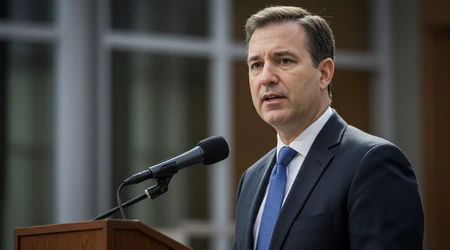Poilievre Proposes Tougher Sentences for Multiple Murders

Poilievre proposes tougher sentences for multiple murders, igniting a firestorm of debate as Canada’s 2025 federal election looms.
Conservative Leader Pierre Poilievre’s pledge to invoke the notwithstanding clause to enforce consecutive sentences for mass murderers has thrust criminal justice reform into the spotlight.
This audacious proposal, announced on April 14, 2025, aims to ensure that those convicted of multiple murders face life imprisonment without parole after 25 years, a stark departure from current laws.
But is this a necessary step to protect victims, or does it risk eroding constitutional safeguards?
This article dives into the nuances of Poilievre’s plan, its implications, and the polarized reactions it has sparked across Canada.
The timing is no coincidence. With the election just days away on April 28, Poilievre’s tough-on-crime rhetoric taps into public frustration over high-profile cases like Paul Bernardo’s parole eligibility.
By framing his policy as a defense of victims’ rights, he’s appealing to voters disillusioned with rising crime rates and perceived leniency in the justice system.
Yet, critics warn that bypassing the Charter of Rights and Freedoms could set a dangerous precedent, threatening Canada’s commitment to human rights.
Let’s unpack the proposal, its context, and what it means for the nation’s future.
The Proposal: A Hardline Stance on Justice
Poilievre proposes tougher sentences for multiple murders to address what he calls a “discount” for multiple killings.
Under current Canadian law, a life sentence typically means 25 years before parole eligibility, regardless of the number of victims.
Poilievre argues this fails to honor each life lost. His plan would allow judges to impose consecutive sentences, potentially keeping mass murderers behind bars for life.
The Conservative leader cites cases like Bernardo, whose parole hearings have outraged victims’ families. Poilievre’s solution?
++ Advance Voting Hits Record High, May Signal Increased Election Turnout
Restore judicial power to stack sentences, ensuring accountability for each victim. This resonates with Canadians who feel the system prioritizes offenders over victims, especially in high-profile cases.
Public sentiment often sways toward harsher penalties after gruesome crimes. Poilievre’s proposal taps into this, framing justice as a moral imperative.
Yet, the plan’s reliance on the notwithstanding clause a rarely used constitutional override raises eyebrows. It’s a bold move, but one that could alienate moderate voters wary of tampering with rights.

The Notwithstanding Clause: A Double-Edged Sword
Invoking the notwithstanding clause to enforce Poilievre proposes tougher sentences for multiple murders is a gamble.
Section 33 of the Charter allows governments to override certain rights for five years, but it’s rarely used federally.
Poilievre’s willingness to deploy it signals a readiness to challenge constitutional norms.
Critics, including Liberal Leader Mark Carney, argue this sets a perilous precedent. If the clause can be used to limit offenders’ rights, what stops future governments from targeting other groups?
The analogy is stark: opening this door is like handing a master key to a house anyone with power could misuse it.
Also read: Canadian Consumer Confidence Hits a New Low Amid Trade Uncertainty
Supporters, however, see it as a necessary tool to correct judicial overreach.
A 2022 Supreme Court ruling struck down a Conservative law allowing stacked sentences, citing Charter violations. Poilievre’s plan sidesteps this, prioritizing victims over legal technicalities.
The debate hinges on whether public safety justifies bending constitutional rules.
Public Reaction: A Nation Divided
Poilievre proposes tougher sentences for multiple murders, and Canadians are split.
A 2025 Angus Reid poll found 62% support harsher penalties for mass murderers, but only 41% back using the notwithstanding clause.
This reveals a tension: people want justice but hesitate to rewrite the rulebook.
In Toronto, rallies for Poilievre draw fervent supporters chanting for change. Take Sarah, a 34-year-old teacher, who told me, “Victims’ families deserve closure, not endless parole hearings.”
Conversely, Ottawa protests highlight fears of eroded rights. Activist Jamal argues, “Today it’s murderers, tomorrow it’s dissenters.”
Social media amplifies the divide. On X, posts praising Poilievre’s “victim-first” stance clash with warnings of a “slippery slope.”
The polarized response underscores a broader question: how far should Canada go to balance justice and rights?
Read more: Bloc Québécois Struggles to Capture Voter Support Amid U.S. Trade War Tensions
The Political Context: Election Strategy or Genuine Reform?
With the election nearing, Poilievre proposes tougher sentences for multiple murders as a calculated play.
His campaign has leaned heavily on cost-of-living and law-and-order issues, appealing to young men and suburban voters.
This proposal reinforces his image as a decisive leader unafraid to challenge the status quo.
Yet, skeptics question the timing. Why announce this mid-campaign, not earlier?
Critics like Carney call it a distraction from Poilievre’s delayed costed platform, released April 22, 2025. The move could energize his base but risks alienating moderates wary of constitutional overreach.
Poilievre’s rhetoric calling Liberals “soft on crime” echoes past Conservative campaigns.
But in 2025, with U.S. trade tensions and economic uncertainty, voters may prioritize stability over bold reforms.
The proposal’s success depends on whether Canadians see it as principled or opportunistic.
Legal and Ethical Implications: A Deeper Look
Poilievre proposes tougher sentences for multiple murders, but the legal fallout could be profound. The Supreme Court’s 2022 ruling deemed stacked sentences “cruel and unusual punishment.”
Overriding this via the notwithstanding clause might face fresh challenges, delaying implementation.
Ethically, the proposal raises questions about rehabilitation. Consider Michael, a hypothetical offender convicted of multiple murders at 20.
Should he never have a chance at redemption? Poilievre’s plan assumes some crimes are unforgivable, but critics argue this undermines the justice system’s redemptive core.
The policy also risks disproportionate impacts. Data shows Indigenous and Black Canadians are overrepresented in prisons.
Tougher laws could exacerbate this, fueling accusations of systemic bias. The ethical tightrope is clear: justice for victims must not deepen existing inequities.
Potential Outcomes: What’s at Stake?
If Poilievre proposes tougher sentences for multiple murders becomes law, the justice system could shift dramatically.
Mass murderers might face true life sentences, easing victims’ families’ pain. But overcrowded prisons and strained budgets could follow, as seen in the U.S.’s mass incarceration era.
Conversely, if the proposal fails, Poilievre risks losing credibility. Voters expecting bold change may feel betrayed, strengthening rivals like Carney.
The election’s outcome will likely determine whether this plan gains traction or fades into campaign rhetoric.
The stakes extend beyond prisons. Using the notwithstanding clause could normalize its use, reshaping Canada’s legal landscape.
Future governments might invoke it for unrelated issues, from labor disputes to free speech. The ripple effects are unpredictable but undeniable.
A Comparative Lens: Learning from Others
Looking globally, Poilievre proposes tougher sentences for multiple murders aligns with policies in jurisdictions like the U.S., where life without parole is common for heinous crimes.
Yet, countries like Norway emphasize rehabilitation, with maximum sentences rarely exceeding 21 years, even for mass killers.
Canada’s hybrid system balances punishment and redemption, but Poilievre’s plan tilts toward the former.
Norway’s approach, while controversial, boasts lower recidivism rates 35% versus Canada’s 41% (Correctional Service Canada, 2023).
Could a punitive shift undermine Canada’s progress on rehabilitation?
The comparison isn’t perfect. Canada’s cultural and crime contexts differ. But examining global models highlights the trade-offs: deterrence versus reform, vengeance versus hope.
Poilievre’s vision leans heavily on the former, but at what cost?
The Bigger Picture: Justice in 2025 Canada
Poilievre proposes tougher sentences for multiple murders, but it’s part of a broader tough-on-crime agenda.
His platform includes anti-fraud measures and drug treatment mandates, signaling a holistic push for public safety. Yet, crime rates tell a nuanced story.
| Year | Homicide Rate (per 100,000) | Violent Crime Rate (per 100,000) |
|---|---|---|
| 2020 | 1.95 | 1,150 |
| 2021 | 1.99 | 1,145 |
| 2022 | 1.88 | 1,139 |
| 2023 | 1.90 | 1,142 |
Homicide rates remain stable, but public perception of crime is worsening, fueled by media and high-profile cases.
Poilievre’s proposal capitalizes on this fear, but does it address root causes like poverty or mental health? A comprehensive approach might yield better results.
The policy also reflects a cultural shift. Canadians are grappling with trust in institutions, from courts to government. Poilievre’s plan, while divisive, taps into a desire for accountability.
But true justice requires more than longer sentences it demands systemic reform.
Conclusion: A Defining Moment for Canada
Pierre Poilievre’s pledge to impose tougher sentences for multiple murders has sparked a reckoning.
It’s a proposal rooted in real pain families haunted by parole hearings, communities shaken by violence.
Yet, it challenges Canada’s legal and ethical foundations, raising a critical question: can justice be served without compromising the principles that define us?
As the April 28 election nears, voters must weigh Poilievre’s vision against its risks. Will this policy restore faith in the justice system, or will it fracture the delicate balance of rights and responsibilities?
The answer lies not just in policy details but in the kind of Canada we want to build.
Poilievre’s gamble could reshape the nation or become a cautionary tale of ambition overreach.
Frequently Asked Questions
Q: What is the notwithstanding clause, and why is it controversial?
A: Section 33 of the Charter allows governments to override certain rights temporarily. It’s controversial because it can undermine constitutional protections, risking abuse.
Q: How would Poilievre’s proposal affect parole for mass murderers?
A: It would allow consecutive sentences, potentially eliminating parole eligibility, ensuring life imprisonment for those convicted of multiple murders.
Q: Has the notwithstanding clause been used federally before?
A: No, the federal government has never invoked it, making Poilievre’s proposal unprecedented and a focal point of debate.
